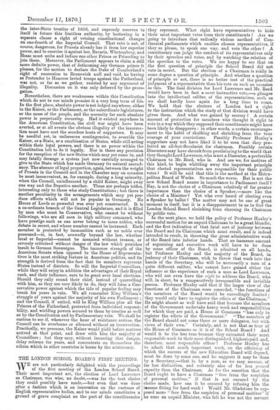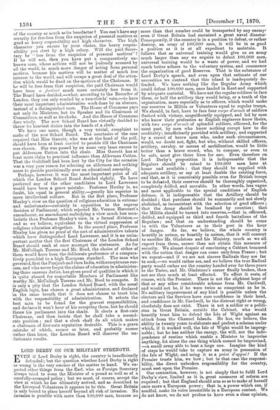THE LONDON SCHOOL BOARD'S FIRST MEETING.
WE are not particularly delighted with the proceedings of the first meeting of the London School Board. Their most important act, the election of. Lord Lawrence as Chairman, was wise, no doubt,—was far the best choice they could possibly have made,—but even that was done after a fashion which is an innovation on the customs of English representative bodies, and to our minds constitutes a ground of grave complaint on the part of the constituencies
they represent. What right have representatives to hide their most important votes from their constituents ? Are we going to introduce that radically vicious method of Con- tinental parliaments which enables chosen representatives, if they so please, to speak one way, and vote the other I A constituency can judge the conduct of its representatives only by their speeches and votes, and by watching the relation of the speeches to the votes. We are happy to see that on the first question of principle the School Board did not vote in secret. But the election of a Chairman is really in some degree a question of principle. And whether a question of principle or not, there is no better test of the practical judgment of a representatiVe than his vote on such an occasion as this. The final division for Lord Lawrence and Mr. Reed would have been in fact a most instructive vote,—a glimpse into the intellectual calibre of the representatives, such as we shall hardly have again for a long time to come. We hold that the electors of London had a right to the instruction which the study of that division would have given them. And what was gained by secresy ? A certain amount of protection for members who thought it right to vote in a way which they supposed their constituents might have been likely to disapprove : in other words, a certain encourage- ment to the habit of skulking and shrinking from the true courage of your convictions. Possibly Professor Huxley's supporters may not have liked it to be seen that they pre- ferred an all-but-Secularist for chairman. Possibly certain Dissenters may have shrunk from proclaiming to the world that they thoughtLord Lawrence, who is not a Dissenter, a preferable Chairman to Mr. Reed, who is. And are we, for motives of this kind, to begin whittling away the important principle that elected representatives are responsible for their public- votes ? It will be said that this is the method at the Metro- politan Board of Works. So much the worse. But is not the new School Board nearer in importance to Parliament itself ? Nay, is not the choice of a Chairman relatively of far greater importance than the choice of a Speaker,—more like the choice of a Minister? Yet who ever heard of electing even a Speaker by ballot ? The matter may not be one of great moment in itself, but it is a disappointment to us to find the London School Board shrinking from choosing its Chairman by public vote.
In the next place, we hold the policy of Professor Huxley's successful motion for an unpaid Chairman to be a great blunder, and the first indication of that fatal sort of jealousy between the Board and its Chairman which must result, and is indeed intended to result, in throwing the great administrative work of the Board into inferior hands. That an immense amount of organizing and executive work will have to be done by some officer of the Board, is admitted on all hands,. but Professor Huxley and the majority of the Board, in jealousy of their Chairman, wish to throw that work into the hands of the Secretary, who will be necessarily a man of a quite different calibre, who cannot have gained either the influence or the experience of such a man as Lord Lawrence, who will not even have the right to address the Board, who will, in short, be a comparatively irresponsible and invisible person. Professor Huxley said that if the larger view of the functions of the Chairman were conceded, " the functions of the members of the Board would be exceedingly limited ; they would only have to register the edicts of the Chairman." He might almost as well have said that because the members of the Government undertake heavy work and responsibilities for which they are paid, a House of Commons " has only to register the edicts of the Government." "The members of the Board should not come there as mere delegates, but with views of their own." Certainly, and is not that as true of the House of Commons as it is of the School Board ? And would it be the less true because they entrusted their most responsible work to their most distinguished, highest-paid, and, therefore, most responsible officer ? Professor Huxley has to admit that much important work, on the efficiency of which the success of the new Education Board will depend, must be done by some one, and he suggests it may be done by a Secretary,—that is, by a man, as we may assume, of far less distinction, and certainly also of far less proved capacity than the Chairman. As for the assertion that the- Board ought to have a Chairman " free from the suspicion of personal motives," if that is not ensured by the choice made, how can it be ensured by refusing him the income fitting for hard work ? Would Mr. Gladstone be sup- posed more " free from the suspicion of personal motives" if he were an unpaid Minister, who felt he was not the servant 'Huxley has given no proof of the sort of administrative talents of danger. So far, we believe, the whole country is -which have distinguished Lord Lawrence, and it is no unim- heartily in unison, so heartily in unison, that it will consent portant matter that the first Chairman of the London School to sacrifice Mr. Gladstone and his Ministry, much as we all Board should rank at once amongst the statesmen. As for expect from them, sooner than not obtain this measure of Mr. McCullagh Torrens and Mr. Reed, the choice of either of security. We almost despair of convincing a Cabinet bemused Ahem would have been the deliberate preference of a compara- with the notion that danger can come only from France ; but tively parochial to a high European standard. The man who we repeat—and if we are not sincere Radicals they are far governed, first the Punjaub and then India, with conspicuous sue- to seek,—we would rather see, and we believe the true Radical cess, and who never forgot the claims of education in administer- party would rather see the country handed over for three years ing those onerous duties, has given proof of qualities in which it to the Tories, and Mr. Gladstone's career finally broken, than is quite absurd for respectable Members of Parliament like not see thus much at least effected. To effect it rests, of worthy Mr. McCallagh Torrens and Mr. Reed to compete. It course, with the Premier. There is not the slightest hope of is only a pity that the London School Board, with the usual that or any other considerable scheme from Mr. Cardwell, English logic, has chosen a great administrator, and declared and would not be, if he were twice as competent as he is. in the same breath that it does not choose to trust him No military improvement of any kind is possible unless the with the responsibility of administration. It selects the electors and the Services have sure confidence in their head, best man to be found for the gravest responsibilities, and confidence in Mr. Cardwell, be the distrust right or wrong, and declares it won't hear of his accepting them, lest he should absolutely does not exist. There is not a soldier or a politi- throw his parliament into the shade. It elects a first-rate cian in Great Britain, outside the Cabinet, who would Chairman, and then insists that he shall take a second- heartily trust him to defend the Isle of Wight against an
mite position ; and that a clerk shall do all which makes attack from the Channel Islands. He has, we believe, the a chairman of first-rate reputation desirable. This is a grave ability in twenty years to elaborate and perfect a scheme under
mistake of which, sooner or later, and probably sooner which, if it worked well, the Isle of Wight would be impreg- -rather than later, the London Board will discover the un- nable ; but he has neither the energy, the will, nor the inde-
:fortunate results. pendence of routine which enable a Minister to- improvise







































 Previous page
Previous page